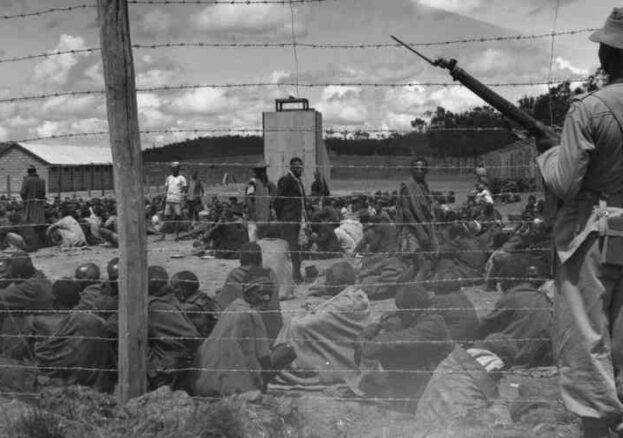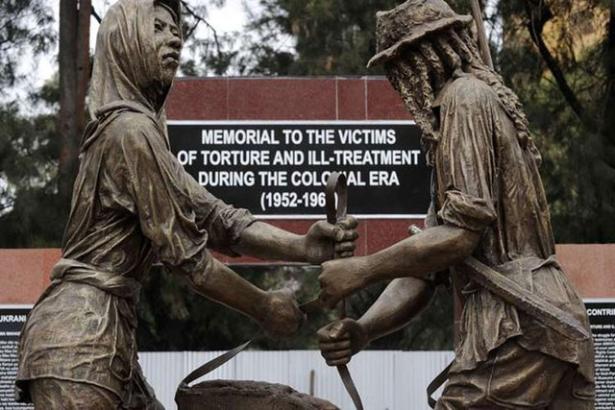
The era of British colonial rule in Kenya is a sombre chapter in the nation’s history, marred by egregious war crimes and violations of human rights. This period was characterised by a relentless pursuit to uphold colonial supremacy, often through brutal and inhumane methods. Central to this historical context was the Mau Mau uprising of the 1950s, an anti-colonial revolt that elicited a ruthless response from the British authorities, marked by a systematic campaign of violence and oppression.
The Mau Mau uprising, initially sparked by economic grievances and inequities, rapidly evolved into a broader fight for national sovereignty. This revolt posed a formidable challenge to the colonial establishment, threatening to upend British control. The British response was a calculated and ferocious crackdown designed to quash the rebellion and reinforce colonial dominance.
Detention camps were a cornerstone of the British strategy to suppress the uprising. Notoriously, Hola Camp became a symbol of the extreme brutality inflicted upon detainees. These camps bore witness to heinous acts of torture and abuse. Men, women, and children were subjected to barbaric methods of interrogation, including beatings, floggings, and electric shocks. The repercussions of such treatment were often severe, leading to lasting physical and psychological damage, and in many cases, death.

Beyond the confines of detention camps, the British forces implemented a strategy of collective punishment. Villages suspected of harbouring Mau Mau sympathizers were systematically targeted. This policy led to mass killings, indiscriminate arrests, and the rampant destruction of homes and livelihoods. Such acts of terror were intended to instill fear among the populace, break the backbone of support for the rebellion, and reinforce the colonial grip over the Kenyan people. Innocent civilians often bore the brunt of this brutal campaign, finding themselves caught in the crossfire of a conflict they had little part in.
Sexual violence was another abhorrent tactic employed by the British forces. Detainees, irrespective of gender, were subjected to rape, sexual assault, and other forms of sexual abuse. Women, in particular, faced targeted and systematic sexual violence. The perpetration of these acts in public settings, often in front of family members, served as a tool for humiliation and exertion of dominance. The legacy of this sexual violence has left deep scars in Kenyan society, contributing to long-term trauma and psychological scars that persist to this day.
Documenting the full extent of the atrocities committed during this period is challenging due to the systematic destruction of evidence by colonial authorities. Nonetheless, conservative estimates suggest that tens of thousands of Kenyans lost their lives, while more expansive estimates indicate that the numbers could reach into the hundreds of thousands. These figures, however, only scratch the surface of the true scale of suffering and injustice inflicted upon the Kenyan people during this dark era.
In recent years, there has been a growing movement towards recognizing and addressing these historical atrocities. The British government’s acknowledgment of these crimes and the offer of compensation to some of the surviving victims have been seen by many as inadequate steps towards true accountability. There is a strong demand for more thorough investigations, an unequivocal acknowledgment of guilt, and a sincere commitment to addressing the lasting impacts of these crimes in pursuit of justice and reconciliation.
As Kenya nears the 60th anniversary of its independence from Britain, this period’s legacy continues to resonate deeply within the nation’s consciousness. The visit of King Charles to Nairobi and his acknowledgment of the “most painful moments” of Kenya’s colonial past marks a significant, albeit small, step in addressing these historical wrongs. In a poignant speech at a state banquet, he expressed profound sorrow for the “abhorrent and unjustifiable acts of violence” committed against Kenyans, emphasizing the importance of confronting this history with honesty and openness.
Recognising and confronting the atrocities of the British colonial era in Kenya is crucial for healing and reconciliation. It is not merely a matter of historical record but a necessary step towards understanding and rectifying historical injustices. As Kenya and Britain continue to navigate their complex shared history, such efforts are essential in laying the groundwork for a future built on mutual respect, understanding, and justice.
